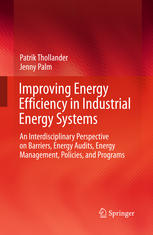

Most ebook files are in PDF format, so you can easily read them using various software such as Foxit Reader or directly on the Google Chrome browser.
Some ebook files are released by publishers in other formats such as .awz, .mobi, .epub, .fb2, etc. You may need to install specific software to read these formats on mobile/PC, such as Calibre.
Please read the tutorial at this link: https://ebookbell.com/faq
We offer FREE conversion to the popular formats you request; however, this may take some time. Therefore, right after payment, please email us, and we will try to provide the service as quickly as possible.
For some exceptional file formats or broken links (if any), please refrain from opening any disputes. Instead, email us first, and we will try to assist within a maximum of 6 hours.
EbookBell Team

0.0
0 reviewsIndustrial energy efficiency is one of the most important means of reducing the threat of increased global warming. Research however states that despite the existence of numerous technical energy efficiency measures, its deployment is hindered by the existence of various barriers to energy efficiency. The complexity of increasing energy efficiency in manufacturing industry calls for an interdisciplinary approach to the issue.
Improving energy efficiency in industrial energy systems applies an interdisciplinary perspective in examining energy efficiency in industrial energy systems, and discusses how “cross-pollinating” perspectives and theories from the social and engineering sciences can enhance our understanding of barriers, energy audits, energy management, policies, and programmes as they pertain to improved energy efficiency in industry.
Apart from classical technical approaches from engineering sciences, Improving energy efficiency in industrial energy systems couples a sociotechnical perspective to increased energy efficiency in industry, showing that industrial energy efficiency can be expected to be shaped by social and commercial processes and built on knowledge, routines, institutions, and methods established in networks. The book can be read by researchers and policy-makers, as well as scholars and practicians in the field.
“This book is extremely valuable for anyone who is designing or executing energy efficiency policies, schemes or projects aiming at SMEs. Both authors deserve the highest respect, and the combination of their expertise makes the results truly unique.” - Daniel Lundqvist, programme manager at the Swedish energy agency
“For anyone interested in improving energy efficiency in industry, this is a must-read. The book combines tools from social science and engineering to discuss the state of art today as well as possible development path tomorrow. This is a compelling book that I find useful both in my teaching and my research.” - Kajsa Ellegård, Professor at Linköping University, Sweden
"The book Improving energy efficiency in industrial energy systems is a novel approach on how improved levels of energy efficiency can be reached in industrial energy systems by merging engineering with social sciences. It is with delight that I can recommend their book to anyone interested in the field.”- Mats Söderström, Director Energy Systems Programme, Linköping University, Sweden